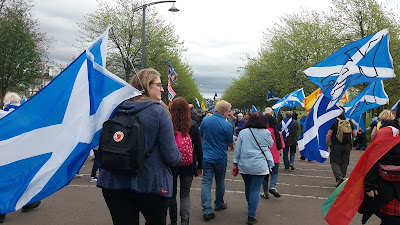So I got a slightly patchier 7 out of 10 qualifiers right on Thursday. The three I didn't pick out were the Netherlands, Serbia and Slovenia. Country music isn't really my thing (as I discovered conclusively on a hellish trip to Millport circa 1995), so that's probably why I underestimated the Netherlands' chances, but I can see why they went through. I'm delighted to have been wrong about Serbia, which sent an uncompromising piece of ethnic music in the Serbian language and deservedly didn't pay any sort of penalty. I must say I have absolutely no idea how Slovenia managed to get through, but I suppose there always has to be one that leaves you scratching your head. I know some people will shrug their shoulders and say "that's the Balkan bloc vote for you", but in fact Slovenia has traditionally benefited much less from neighbourly voting than the other ex-Yugoslav nations.
On to tonight, then. Until a few days ago, it looked like this year's contest was going to be a simple case of working out whether the overwhelming favourites (Israel) would meet expectations, or would spectacularly fail on the night as quite a few overwhelming favourites have done in the past. But, remarkably, Israel do not even go into tonight's final as favourites, because they were dramatically overtaken by Cyprus as the rehearsal videos started to filter through. A couple of days ago, the betting odds seemed to be pointing towards a straight fight between Cyprus and Israel with everyone else as also-rans, but then Ireland stormed out of nowhere into a decent third place.
I'm not sure I can make much sense of all that. I agree that Cyprus is a much more plausible winner than Israel, but it's just one of several strong songs/performances that are all roughly on a par with each other, so I can't understand why it's in quite such a commanding position in the betting. My guess is that the Irish surge is due to a couple of factors - a) the favourable position in the draw, and b) the publicity over a Chinese TV station being banned from broadcasting Eurovision because they censored two men dancing together as part of the staging of the Irish song. In other words, people seem to be putting their money on the story behind the song, rather than the song itself. That can sometimes be a dangerous thing to do - if a story is enough, why didn't Bosnia come close to winning in 1993?
What I've just said makes it sound like I don't rate the Irish song. In fact, the opposite is true - it's one of my personal favourites, and it's beautifully sung. I just fear that it's too low-key to do much damage. Just occasionally, very gentle songs can stand out so effectively among all the identikit screeching that they win by a mile - last year's Portuguese winner is an excellent example, of course, as is Ireland's own victory in 1994 with Rock'n'Roll Kids. But for what it's worth, my gut feeling is that it probably won't happen this time.
My suspicion is that Cyprus will be in the mix tonight, but that their main competitors will not be Israel and Ireland, but Norway and Sweden. I struggle to separate Cyprus, Norway and Sweden, but I think Norway (in spite of having the most irritatingly catchy song of the evening) is perhaps the least likely of the three to win if only because of its place in the draw. Probably just as well, because the mind boggles as to how insufferable Alexander Rybak would become if he has anything more to be smug about. Cyprus v Sweden is almost a coin-toss as far as I'm concerned, but I'll cop out and go with the conventional wisdom that Cyprus will win. I expect it to be a close one, though.
Here's my full prediction -
Winners: Cyprus (Fuego - Eleni Foureira)
2nd: Sweden (Dance You Off - Benjamin Ingrosso)
3rd: Norway (That's How You Write A Song - Alexander Rybak)
4th: Estonia (La Forza - Elina Nechayeva)
5th: France (Mercy - Madame Monsieur)
Possible dark horses: Austria, Australia
UPDATE (7.20pm): Of course, another potential explanation for the sudden Irish surge in the betting is that the full results of Tuesday's semi-final (which are supposed to be absolutely secret until the end of the contest) might have been leaked. Unlikely, but possible. If so, it could be Dublin next year.



























